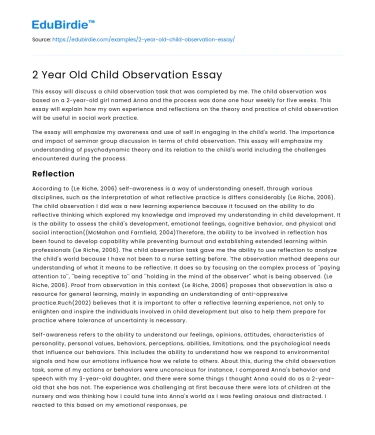This essay will discuss a child observation task that was completed by me. The child observation was based on a 2-year-old girl named Anna and the process was done one hour weekly for five weeks. This essay will explain how my own experience and reflections on the theory and practice of child observation will be useful in social work practice.
The essay will emphasize my awareness and use of self in engaging in the child's world. The importance and impact of seminar group discussion in terms of child observation. This essay will emphasize my understanding of psychodynamic theory and its relation to the child's world including the challenges encountered during the process.
Reflection
According to (Le Riche, 2006) self-awareness is a way of understanding oneself, through various disciplines, such as the interpretation of what reflective practice is differs considerably (Le Riche, 2006). The child observation I did was a new learning experience because it focused on the ability to do reflective thinking which explored my knowledge and improved my understanding in child development. It is the ability to assess the child's development, emotional feelings, cognitive behavior, and physical and social interaction((McMahon and Farnfield, 2004)Therefore, the ability to be involved in reflection has been found to develop capability while preventing burnout and establishing extended learning within professionals (Le Riche, 2006). The child observation task gave me the ability to use reflection to analyze the child's world because I have not been to a nurse setting before. 'The observation method deepens our understanding of what it means to be reflective. It does so by focusing on the complex process of ''paying attention to'', ''being receptive to'' and ''holding in the mind of the observer'' what is being observed. (Le Riche, 2006). Proof from observation in this context (Le Riche, 2006) proposes that observation is also a resource for general learning, mainly in expanding an understanding of anti-oppressive practice.Ruch(2002) believes that it is important to offer a reflective learning experience, not only to enlighten and inspire the individuals involved in child development but also to help them prepare for practice where tolerance of uncertainty is necessary.
Self-awareness refers to the ability to understand our feelings, opinions, attitudes, characteristics of personality, personal values, behaviors, perceptions, abilities, limitations, and the psychological needs that influence our behaviors. This includes the ability to understand how we respond to environmental signals and how our emotions influence how we relate to others. About this, during the child observation task, some of my actions or behaviors were unconscious for instance, I compared Anna's behavior and speech with my 3-year-old daughter, and there were some things I thought Anna could do as a 2-year-old that she has not. The experience was challenging at first because there were lots of children at the nursery and was thinking how I could tune into Anna's world as I was feeling anxious and distracted. I reacted to this based on my emotional responses, personal valves, and perceptions but during the seminar discussion, I was able to be aware and reflect on my actions on how to perceive children and learn that children's development is different. Also, I was able to develop my ideas and thinking towards reflection.
Both transference and countertransference can be used to understand the children's world, however, it is understood that both processes help an observer in the aspect of thinking about what is happening around a beneficial relationship.






 Stuck on your essay?
Stuck on your essay?

